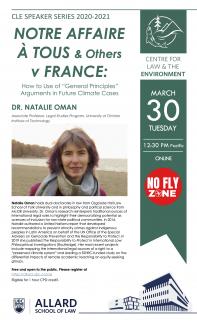NO FLY ZONE SPEAKER: Notre Affaire à Tous and Others v. France: How to Use "General Principles" Arguments in Future Climate Cases

Centre for the Law and the Environment Assistant
Mar 15, 2021
[NEW DATE] Join us on March 30 for a public talk by Dr. Natalie Oman!
In the recent French climate case, Notre Affaire à Tous and Others v. France, a group of four NGOs claimed that the human rights of French citizens were being violated by their government's failure to meet 2020 GHG emissions reduction targets under the Paris Agreement. They argued that this failure constituted a violation under domestic law, EU treaty law, and general principles of law. The plaintiffs based their claim in part on the assertion that a right to a "preserved climate system" is a general principle of law. They characterized this general principle as stemming from both national and international legal sources.
In February of this year, the Administrative Court of Paris awarded the plaintiffs the symbolic sum of 1 euro for moral prejudice, but deferred its decision on whether to issue an injunction against the French government requiring specific remedial climate measures. The French government has until early April to report to the Court on steps it is taking to meet its Paris targets.
This talk argues that one of the most important contributions of this case lies in the connection it highlights between general principles and human rights protection. It outlines how general principles, a poorly understood category of international law, can be developed and exploited as a rich resource for pursuing climate litigation.
About the Speaker

- Centre for Law and the Environment


